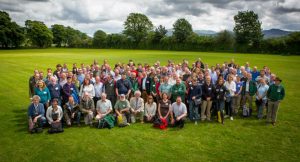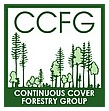CCFG National Conference 2014
 |
CCFG National Conference 2014
|
Background And Theme
The goals of the conference were to:
- Present latest developments in CCF management systems, especially focusing on the potential of CCF to promote sustainability and resilience.
- Demonstrate examples of CCF in practice, under a range of management objectives.
- Identify future measures that could result in wider adoption of CCF in Britain including consideration of aspects relevant to research and policy.
The conference attracted 140 participants from across the British Isles and from North America. Presenters included leading researchers, policy-makers and practitioners. The programme comprised both plenary sessions and site visits to Wythop and Thirlemere Forests, with technical presentations taking place in the two woodlands. There was also an optional third day of site visits to the western Lakes.
Programme, Talks and Presentations
Menu of CCFG National Conference 2014 Content:
- 2014 Conference Information– the original proposal document which sets out the context and themes of the conference.
- Research Poster Display – posters of 8 research projects which were on display in the Conference premises, 4 of which were winners of a student poster award funded by the School of Geosciences, University of Edinburgh.
- 2014 Conference Resources – the outputs from the conference: pdfs of speaker presentations (some also in MP4 format); conference report; photographs.
Thanks
We are grateful to the Forestry Commission for providing funding for the conference report and these web pages, enabling presentations and discussion from the conference to be made available to a wider audience.
Thanks also to the Scottish Forestry Trust for their support for the conference, including funding our visiting Keynote Speaker, Klaus Puettmann, Professor of Silvicultural Alternatives, Oregon State University.
We would like to thank the Local Organising Committee and in particular Ted Wilson, who worked tirelessly to present an excellent programme and make the conference such a success, and the speakers, volunteers, delegates and many others who contributed in so many ways.
Our thanks too to all our partners and sponsors who supported the conference with both generous donations and/or in kind.


